Phrases No Professional Should Say in the Workplace
Far too often, we sabotage ourselves in the workplace — and we don’t even realize it.
Certain commonplace words and phrases, while seemingly harmless, when used in the office can make one appear unprofessional or uneducated. Verbally expressing casualness and uncertainty, or playing the blame game around coworkers and superiors, can do irreparable harm to your reputation and advancement potential.
You alone are responsible for how you represent yourself to others, and therefore the consequences of a poor image fall on no one else.
On the other hand, confidence, respectful formality and taking responsibility can make all the difference. These small, easy changes to your verbal interactions at work can help you stand out to your superiors, and can give your career that extra push it needs.
Avoiding these key phrases will set you apart. You’ll go from just another employee, to someone who clearly cares how they are seen in the workplace and who has advancement in mind.
Don’t Seem Grammatically Challenged
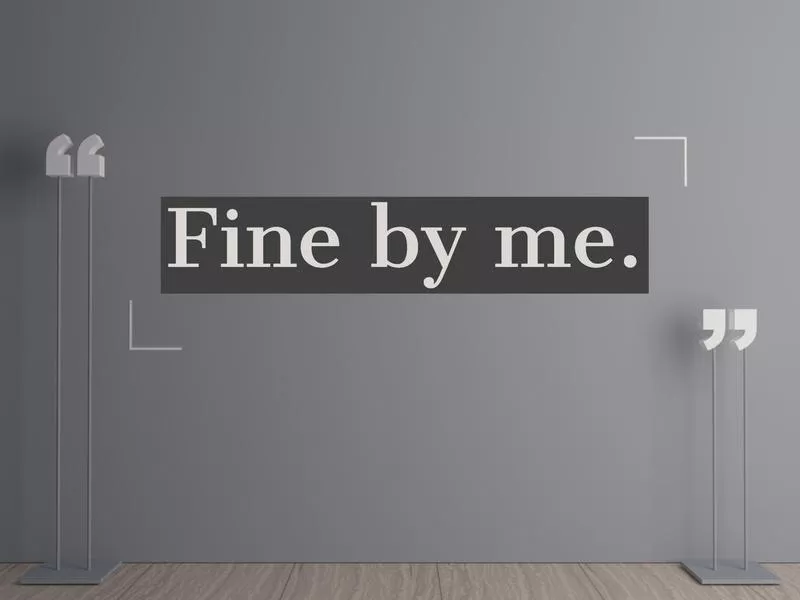
Getty Images
Here we have an issue with casualness that leads to improper grammar.
What you mean when you say “fine by me” is that you’re okay with whatever is being asked of you. While your meaning will more than likely translate, it can make you seem grammatically challenged as well as lazy. At the very least, say “fine with me,” which does less to offend the rules of the English language.
Even that, however, can come across as disengaged or uninterested. At best, it’s a weak agreement. Finding a stronger way to indicate your agreement is well worth the effort.
Don’t Be Casual

Getty Images
Once again, with this phrase we encounter an issue of casualness.
In the right context and said with the right tone, it can be a friendly, amiable way to show off a relaxed personality. Around your superiors in the workplace, however, it’s not the best choice.
Office situations can get tense or stressful. A better way to diffuse those feelings, rather than with an overly casual phrase, is simply through body language. Poise and a confident “aura” can do more to bring a sense of calm and confidence to the office than any word. Those around you will notice if you exude cool when others might panic.
Don’t Be Defensive
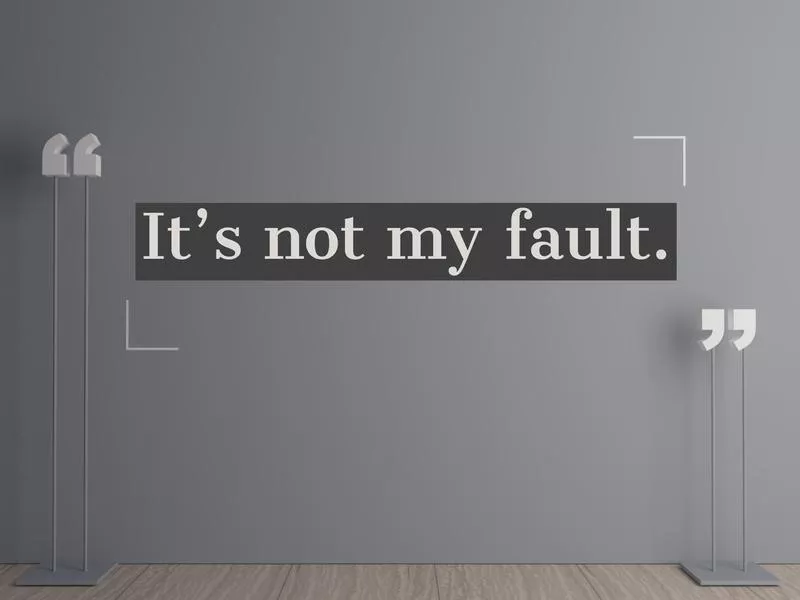
Getty Images
Nobody likes taking the blame for anything, whether it’s their fault or not.
Criticism just doesn’t fall comfortably on the ear. More likely than not, unfortunately, you will be criticized or blamed at some point in your career. When that happens, knowing how to respond can bring you away from that confrontation in better standing than when you entered it.
The key, whether or not you are actually at fault, is to not shift or avoid the blame. Even if the fault does not lie entirely with you, know that your superiors are likely aware of that. Don’t focus on bringing awareness to the shortcomings of others, and don’t try to excuse your role in whatever went wrong.
Instead, ensure your superiors know that you understand how you are at fault and where you went wrong, and how you will correct that issue in the future. That’s all it takes to earn respect out of a misstep.
Don’t Shift Blame
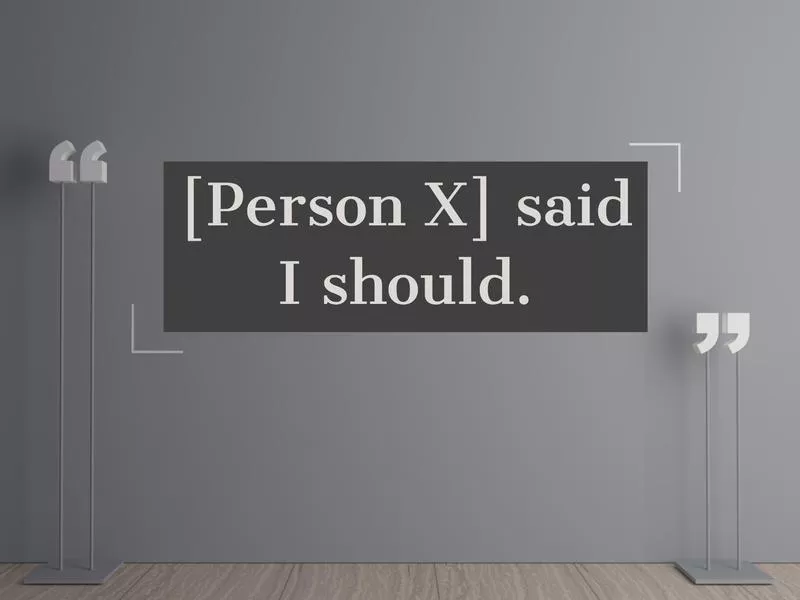
Getty Images
This problem phrase usually follows the previous one. Blame shifting is never a good idea.
In explaining that you did something a certain way because another person told you to do it that way, you demonstrate a lack of independence and critical thinking. Your instructions should always come from your direct superior, or else theirs.
If someone else is telling you to do your work a certain way, it never hurts to check with your boss to be sure that’s the way they want it done. If you’re ever uncertain about particular instructions, ask for clarification. Do whatever it takes to ensure you don’t find yourself in a blame-shifting situation later on.
Don’t Sound Weak
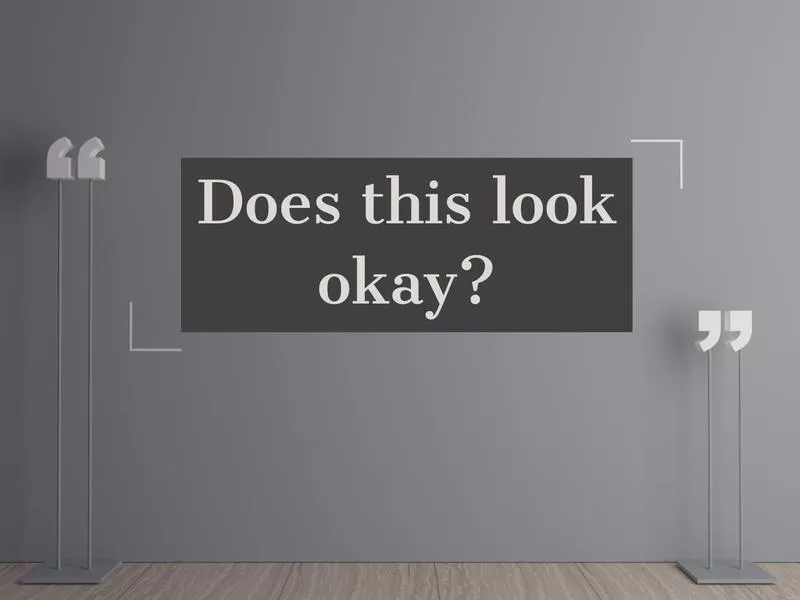
Getty Images
The problem with this phrase is that it’s weak.
It’s fine to have questions about an assignment, and it’s fine to make sure the final product is up to snuff or that you’re heading in the right direction. However, it’s best to avoid sounding unsure of yourself while asking the questions you need to ask.
Instead, ask something like, “Is this what you’re looking for?”
It will get you the same information, but the slight tweak in wording accomplishes two things: it sounds stronger, and it makes the question about them instead of you. You’re no longer questioning what you’ve done, and are now asking about what they want.
It’s subtle, to be sure, but fine lines are often what we walk in professional situations.
Don’t Lock Your Position
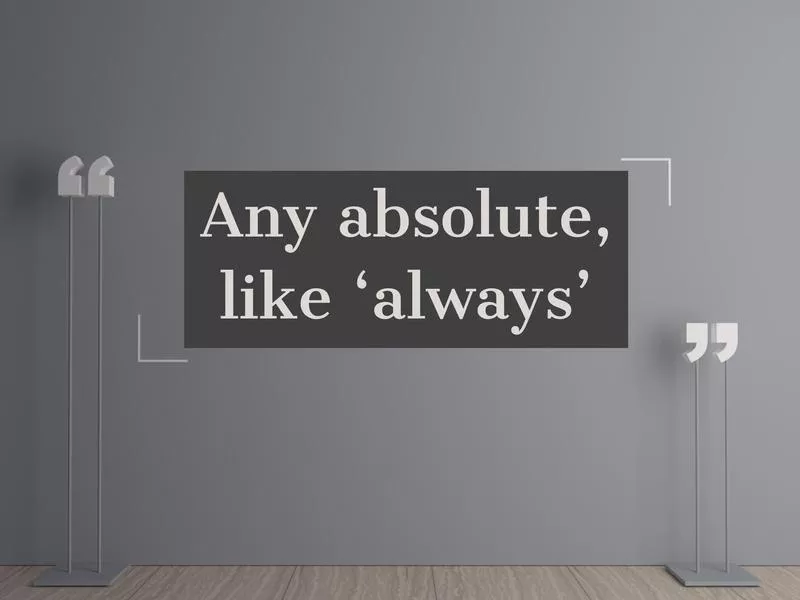
Getty Images
Absolutes, like “never” and “always,” are rarely necessary and rarely helpful.
As modifiers to describe your habits, they add nothing and instead put your reputation on the line. Perfection is a myth, and nobody “always” does something a certain way. Tell your boss you “always” perform a task in a particular manner, and you become unreliable the first time you fail to do so.
By using absolutes, you set yourself up for failure. We all need some wiggle room in all aspects of our lives, and perhaps nowhere more so than in our professional lives. Make things a bit easier on yourself by avoiding absolutes when possible.
Don’t Be Vague
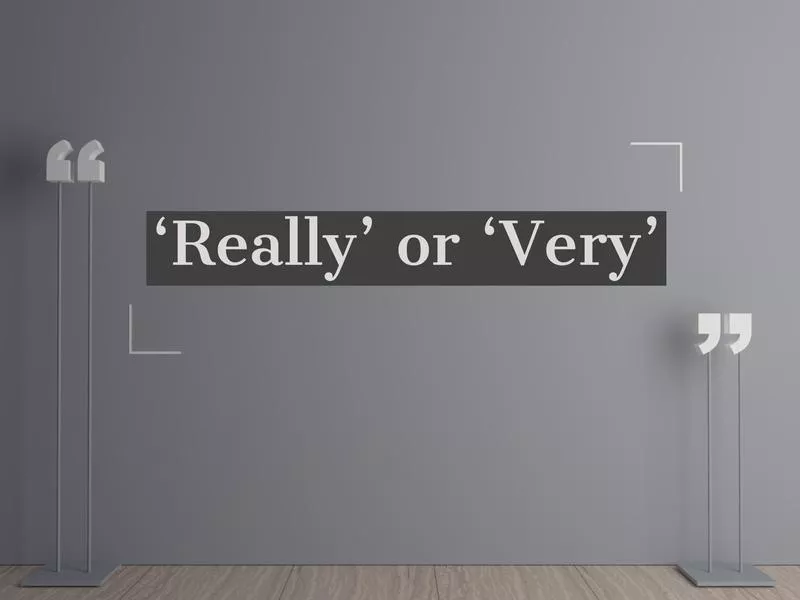
Getty Images
The problem with these most common of modifiers is that they don’t add anything to a description and are unspecific.
For example, if you were to describe a computer as “very fast,” you haven’t offered the other party to the conversation any real information. Why is it more than just “fast”? What makes it faster than a similar computer, and how much faster is it? What’s its speed analogous to, and how does that speed translate to performance?
“Very” and “really” can’t answer any of these questions, and don’t provide any information on their own. A more specific description will let the person you’re talking to know that you understand the subject matter.
A demonstrably deeper understanding will leave an impression on your colleagues.
Don’t Be Vague, Part Two
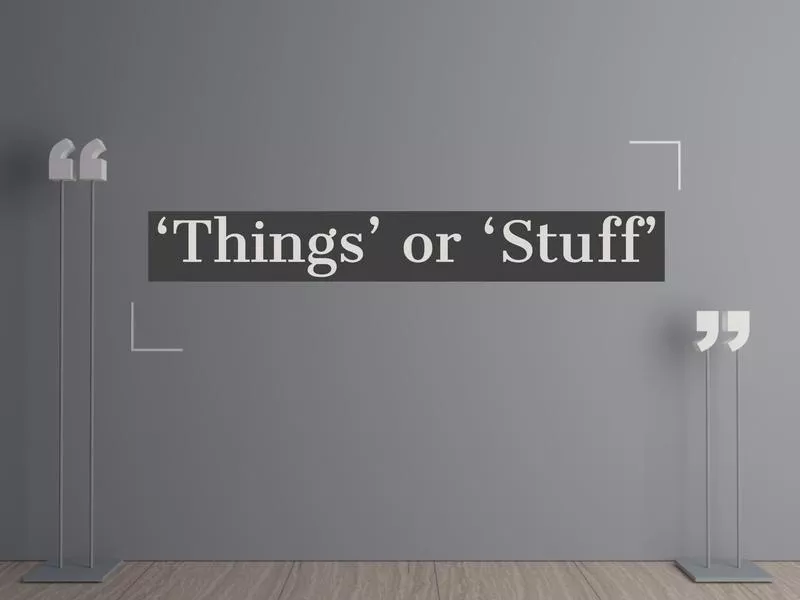
Getty Images
These next two common words carry the same basic flaw as the previous two: they’re unspecific.
They’re also informal and unnecessary. If you’re speaking to a potential customer and that person wants to know what services your company can provide, you might be tempted to answer by stating that your company can provide “things like…” Take out the “things like” and just tell the customer what your company can do. You work there. You should know.
Be an authority in your field. Take the time to learn your industry, your company and your products. Those who can show what they know will always go farther than those who can’t.
Don’t Be Vague, Part Three
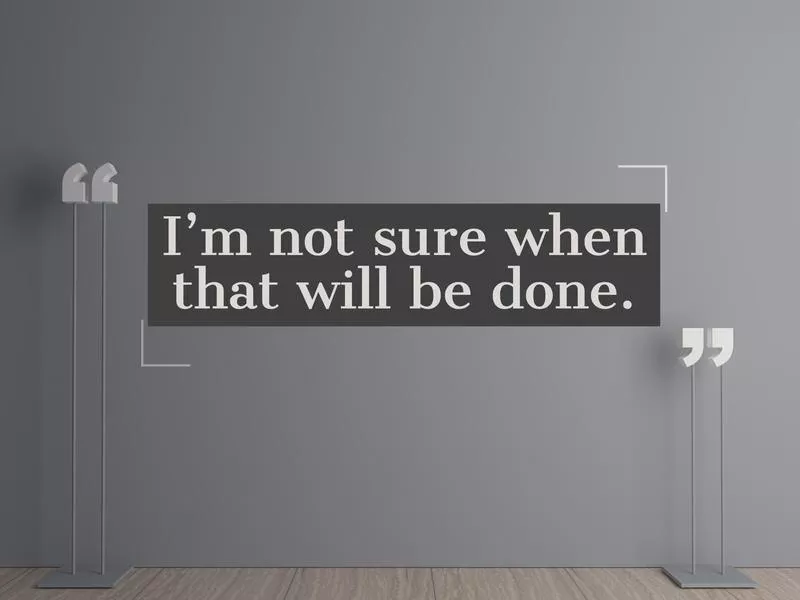
Getty Images
Timelines are important in a professional setting. Everything has a deadline, and not meeting those deadlines can be deadly for your career and the welfare of your company as a whole. When you’re given a task, sometimes you’ll be told when it needs to be done. However, sometimes your supervisor will ask you when you can have it done by.
Don’t just respond by saying you don’t know. Even if you aren’t sure exactly how long the task will take to complete, give your best estimation. If your self-imposed deadline is approaching and you don’t believe you’ll be done in time, update your supervisor and tell them why it’s taking longer than expected. They’ll appreciate the job being done properly, even if it takes a bit longer, and the update will make you seem responsible and reliable.
Don’t Be Inflexible
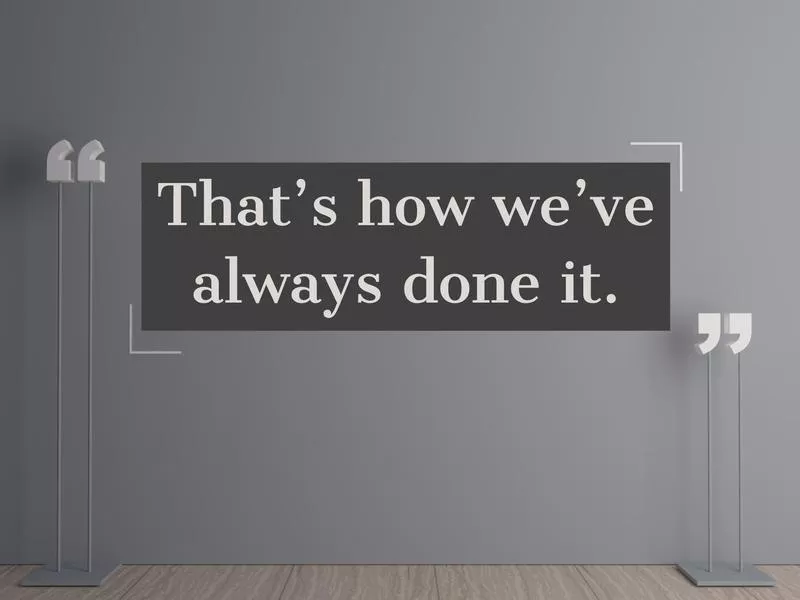
Getty Images
This phrase is problematic in that same way as saying someone told you to do something a certain way. It demonstrates a lack of independence and critical thinking.
The fact that a process has been in place for a period of time doesn’t mean it’s the best way to do something. Innovation is good, and streamlining will always welcomed by any employer.
If you think you can find a better way to get your work done, do it. If you already have, tell your boss about it. Thinking outside the box to find new solutions will impress those you work with and will move you up promotion lists.
Don’t Use Unnecessary Words

Getty Images
Like “very” and “really,” using “literally” as a modifier adds nothing to a description. It’s an unnecessary filler word. You should be literal when speaking in a business setting, unless you’re obviously using hyperbole or an analogy to make a point.
The word “literally” has become a plague on the English language; it’s overused, particularly in the wrong situations. Too often, it’s either used when the user is not actually being literal, or is clearly being literal anyway.
Avoiding unnecessary words in your conversations will make it more enjoyable for people to listen to you speak. You want to be heard, so avoid words that could cause listeners to disengage.
Don’t Use Filler

Getty Images
This is the most common filler used in conversation, but it’s best to avoid using it at all costs.
We all sometimes have to think about what we’re going to say before we say it, or have to take a moment to conjure up information. It’s better, however, to go into professional conversations prepared. Study the information you’ll need so that your recall will be as instantaneous as possible and you eliminate the need to think about your answers.
Saying “uhh” will make it seem as though you don’t know what you’re talking about, and it also just sounds dumb. You might know everything there is to know about whatever you’re talking about; however, if you hesitate or fill in dead space with a sound like “uhh,” your listeners will start to tune out.
Don’t Be a Pushover
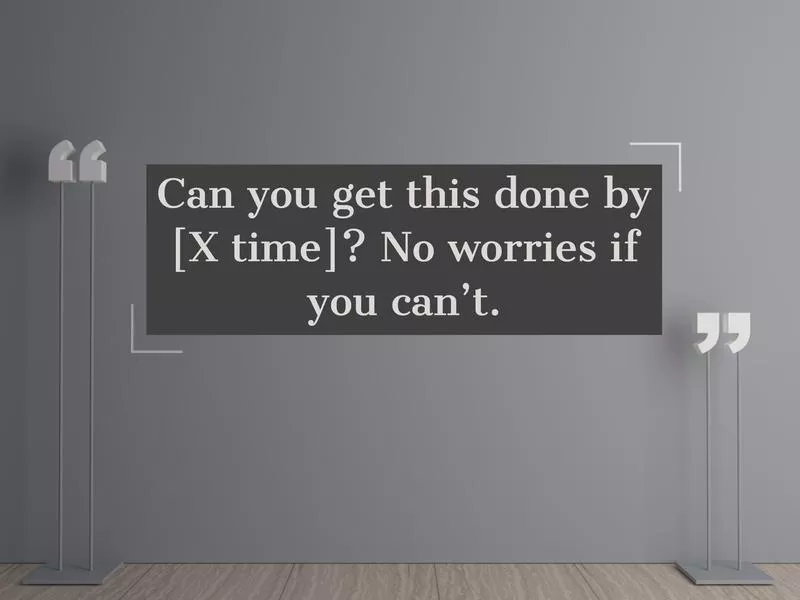
Getty Images
We strive in our daily lives to avoid rubbing others the wrong way, and rigidity often does just that. Yet, while flexibility is nice, it’s often unhelpful in a professional setting.
First of all, businesses run on deadlines. If something needs to be done by a certain time, it’s a pretty big deal if the person responsible can’t get it done by then. If you have to work with a partner or delegate work to coworker, let them know when their portion of the project must be completed by. It’s up to them to find a way to get it done by that time.
This kind of phrase also makes you sound weak, and a bit like a pushover. Your coworkers or employees might think all they have to do to get out of doing something is say they don’t have time. That will eat into your authority and the efficiency of your business.
Don’t Say What Everyone Already Knows

Getty Images
This fun, jokey saying, used at work, is wholly inappropriate. Everyone loves Friday, and everyone loves the weekend. There’s no need to say so, particularly in the office.
You want your superiors and coworkers to think you aren’t just there to earn a paycheck and then run out the door. You want them to think you want to be there, that you care about your job and that you like what you’re doing.
Your work doesn’t have to be your life, but it does have to be part of your life, and you should want your supervisors to think you want it to be part of your life.
Workers who don’t have a demonstrable passion for what they do, or who display outward disdain for what they do, will find it remarkably hard to advance in their professional lives.
Don’t Be a Know-it-All

There will be times at work when you will be listening to a co-worker, and you’ll hear them say something that you know to be incorrect. You’ll want to correct them, and in most instances that’s the correct course of action. Particularly at work, having the right information is critical.
At the same time, nobody likes a know-it-all. “Actually,” for some reason, is a particularly easy word to say in a patronizing or condescending tone. It’s a word that leaves a bad taste in people’s mouths. It makes others reluctant to interact with you, and that can only harm you at work.
There are other ways to introduce whatever information you want to convey. Phrases like, “I’d just like to add…” or “I don’t mean to correct you, but…” are gentler ways to show what you know.
Don’t Highlight Your Blind Spots
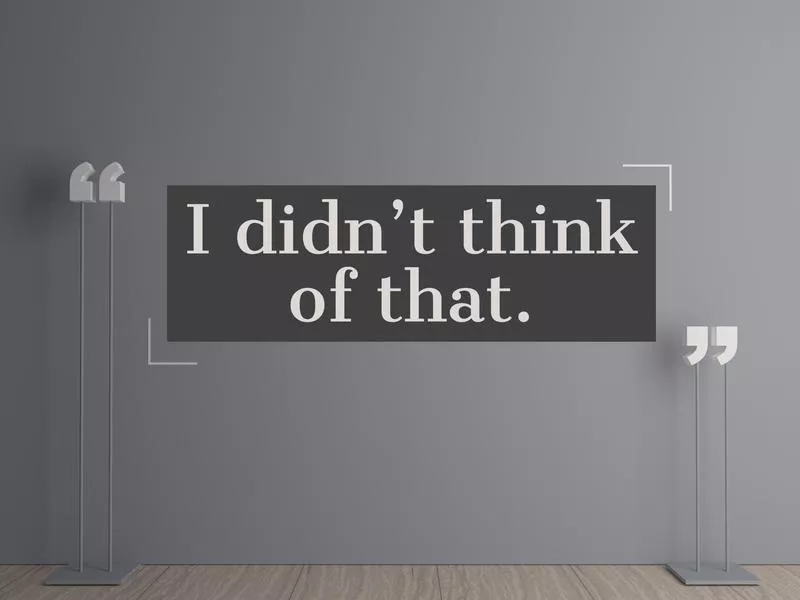
Getty Images
You aren’t expected to think of everything when working on an assignment. You may try your best, but nobody is perfect. Everybody misses something or ignores a possible angle. At times, however, a supervisor may ask why you chose to complete an assignment in one way instead of another.
The truth may be that you simply didn’t think of the other way to approach the assignment, and that’s fine. You don’t have to say that you didn’t think of it, and you absolutely shouldn’t. Saying that would make it seem as though you didn’t think about the project at all.
Luckily, there’s another truth, a much better one. Instead of admitting you didn’t think of something, explain why you went about the project the way that you did, and why you believed that method would be sufficient. If your supervisor wants you to take a different route in the future, be sure to acknowledge that.
Don’t Defer
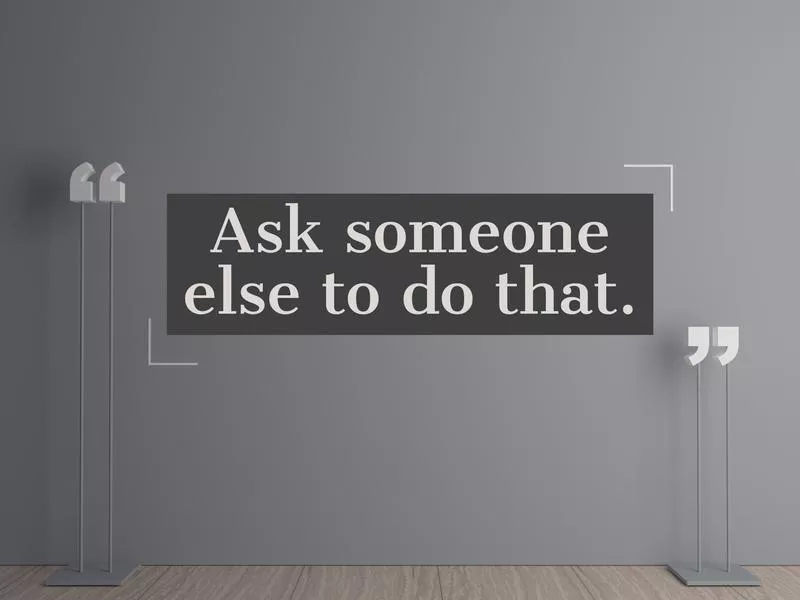
Getty Images
Unless you are absolutely unqualified, or don’t have the requisite knowledge, or don’t have time to complete the task you have been assigned without letting other tasks fall to the wayside, don’t reject an assignment. You want to be the person you co-workers and supervisors rely on. You want to be dependable. You want to seem as though you care about your work.
If you have a very good reason for being unable complete the assignment adequately, absolutely say so. Your supervisor will appreciate that much more than a shoddy job done. However, if you can do something, then just do it.
Don’t Put Limits on Your Career
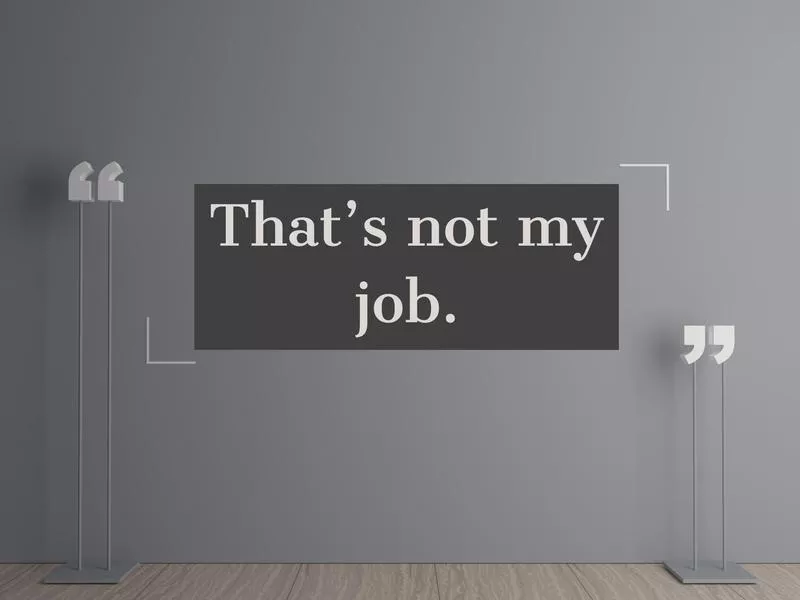
Getty Images
Every now and then, you might be asked to do something that doesn’t exactly fall within your job description. However, that’s no reason to turn your nose up at the task. If it’s something your supervisor is asking you to do, it’s likely important and it’s likely something they feel comfortable trusting you with. You want to validate that trust and show that the things your supervisor finds important also matter to you.
Turning down an assignment puts a limit on your career. You’ll seem less willing and less capable, and you won’t earn that go-to reputation that makes one employee stand out from another. If the assignment is something you’re capable of doing, then do it. You want to be reliable and flexible, and to be the person other people think of when something important needs to be done.
Don’t Be Negative
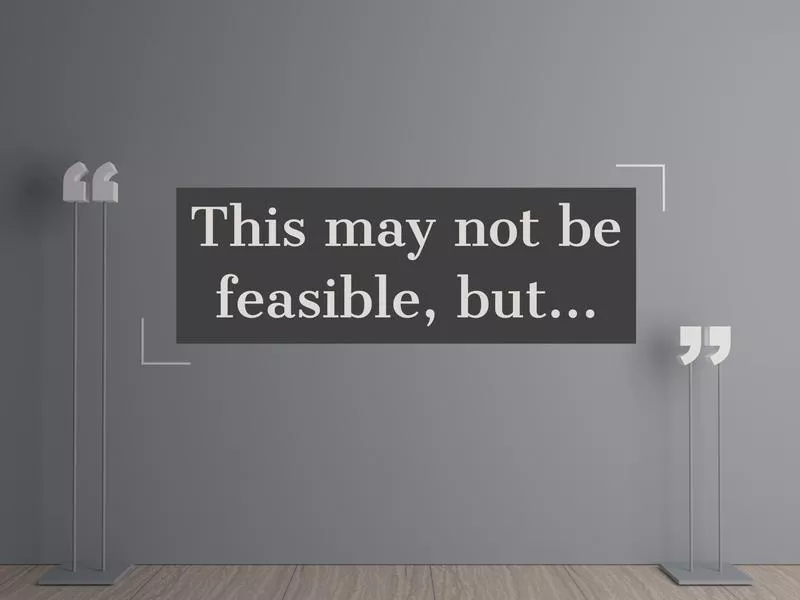
Getty Images
Never speak in negatives. If you’re presenting a new idea at work, you want to make it sound as positive as possible. That will give others a positive impression of the idea right off the bat. Let your ideas speak for themselves.
Even if you aren’t sure if your idea can work, simply present the idea without expressing that doubt. Let your supervisor decide if the idea can be put into action. Whether it can or can’t, presenting new ideas will show that you are thinking about and engaged with your work. Presenting it without negatives attached will show confidence.
Don’t Hint at Issues
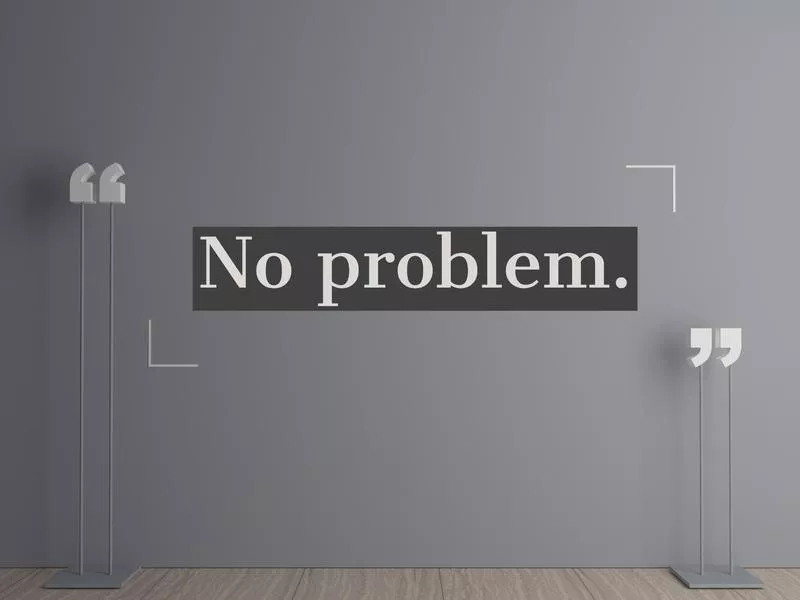
Getty Images
This isn’t a bad one, but saying “No problem” in response to a request from a superior could give the impression that there was a chance it might have been a problem. If your boss asks you to do something, rarely should it ever be a problem. It should be something you’re happy to do.
While eliminating this phrase won’t make or break your career, a more positive response, like “I’d be happy to.” is simply more pleasant and will make you seem like a more positive person. Positivity is always a plus, and negativity never helps. Jump at any opportunity to be more positive.
Don’t Tell People What You Can’t Do
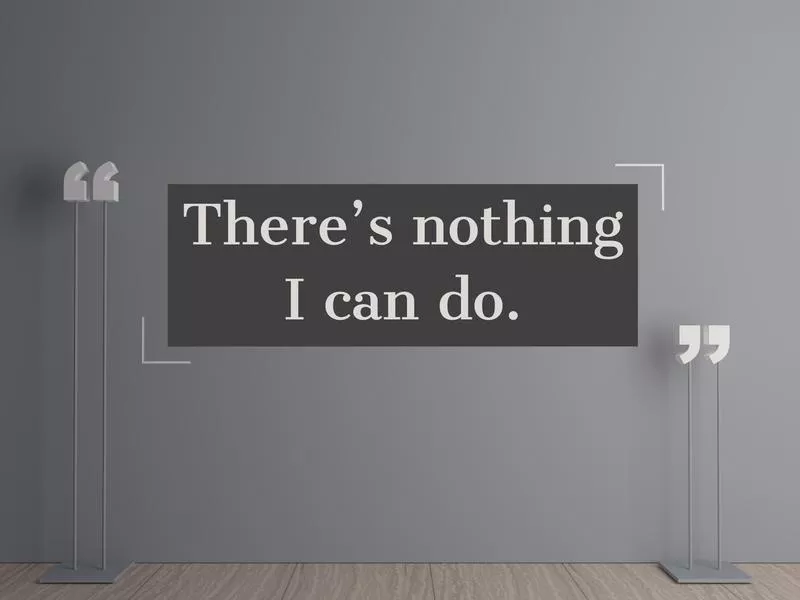
Getty Images
Some tasks actually are impossible and some problems actually are unfixable, but that’s not the point. You never want to tell people what you can’t do. That will put limits on what can be expected of you. Promotions are given to those who can, not to those who can’t.
If you’re asked to do something you’ve tried and failed to do once before, work in a positive response. Offer to try again. Talk about what you can do. Discuss what is possible. Even if there are certain things you are incapable of, make sure people remember what you are capable of.
Don’t Project a Lack of Confidence

Getty Images
Confidence is the key to just about everything. The goal is to appear confident in your work, but your words can seriously hamper your pursuit of that goal. This phrase can make it seem as though you feel you aren’t making sense when explaining things. That, in turn, can make it seem as though you aren’t confident in your understanding of your work.
You certainly will encounter times when you need to offer further explanation, but there are positive ways to create the opportunity for that. Phrases like “What are your thoughts?” and “Do you have any questions?” allow the person you are speaking with to get any clarification they might need and to get more involved in the topic or task at hand. You avoid doubting yourself and engage your audience. That’s a win-win.
Don’t Elicit Eye-Rolls By the Dozen

Getty Images
These phrases permeate our language and or daily conversations, but they’re rarely useful. Particularly in a business setting, where clarity can impact productivity and, therefore, profits, Beating around the bush is a waste of time and energy.
Avoid clichés and just say what you’re trying to say. People appreciate directness. Plus, clichés are lame. They elicit eye-rolls by the dozen. Be the person people like listening to, not the one they dread hearing from. Clichés are disengaging, and you want people engaged when you speak.
You want to be memorable, not forgotten. Upgrade your lexicon by dumping tired clichés.